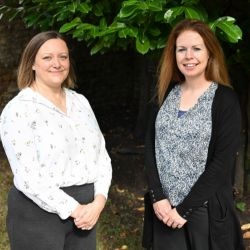-
Study
-
Undergraduate
- UCAS Clearing & Confirmation 2025
- Application Guides
- UCAS Exhibitions
- Foundation Years
- School & College Outreach
- Information for Parents
-
Postgraduate
- Application Guide
- Postgraduate Research Degrees
- Flexible Learning
- Change Direction
- Register your Interest
-
Student Life
- Students' Union
- The Hub - Student Blog
- Accommodation
- Northumbria Sport
- Support for Students
-
Learning Experience
- Real-World Learning
- Research-enriched learning
- Graduate Futures
- The Business Clinic
- Study Abroad
-
-
International
International
Northumbria’s global footprint touches every continent across the world, through our global partnerships across 17 institutions in 10 countries, to our 277,000 strong alumni community and 150 recruitment partners – we prepare our students for the challenges of tomorrow. Discover more about how to join Northumbria’s global family or our partnerships.
View our Global Footprint-
Quick Links
- Course Search
- Undergraduate Study
- Postgraduate Study
- Information for Parents
- London Campus
- Northumbria Pathway
- Cost of Living
- Sign up for Information
-
International Students
- Information for Students
- International Events
- Application Guide
- Entry Requirements and Education Country Agents
- Global Offices
- English Requirements
- English Language Centre
- International student support
- Cost of Living
-
International Fees and Funding
- International Undergraduate Fees
- International Undergraduate Funding
- International Masters Fees
- International Masters Funding
- International Postgraduate Research Fees
- International Postgraduate Research Funding
-
International Partners
- Agent and Representatives Network
- Global Partnerships
- Global Community
-
International Mobility
- Study Abroad
- Information for Incoming Exchange Students
-
-
Business
Business
The world is changing faster than ever before. The future is there to be won by organisations who find ways to turn today's possibilities into tomorrows competitive edge. In a connected world, collaboration can be the key to success.
More on our Business Services -
Research
Research
Northumbria is a research-rich, business-focused, professional university with a global reputation for academic quality. We conduct ground-breaking research that is responsive to the science & technology, health & well being, economic and social and arts & cultural needs for the communities
Discover more about our Research-
Quick Links
- Research Peaks of Excellence
- Academic Departments
- Research Staff
- Postgraduate Research Studentships
- Research Events
-
Research at Northumbria
- Interdisciplinary Research Themes
- Research Impact
- REF
- Partners and Collaborators
-
Support for Researchers
- Research and Innovation Services Staff
- Researcher Development and Training
- Research Ethics and Integrity
- University Library
- Vice Chancellors Fellows
-
Research Degrees
- Postgraduate Research Overview
- Doctoral Training Partnerships and Centres
- Academic Departments
-
Research Culture
- Research Culture
- Research Culture Action Plan
- Concordats and Commitments
-
-
About Us
-
About Northumbria
- Our Strategy
- Our Staff
- Our Schools
- Place and Partnerships
- Leadership & Governance
- University Services
- History of Northumbria
- Contact us
- Online Shop
-
-
Alumni
Alumni
Northumbria University is renowned for the calibre of its business-ready graduates. Our alumni network has over 250,000 graduates based in 178 countries worldwide in a range of sectors, our alumni are making a real impact on the world.
Our Alumni - Work For Us
What will I learn on this module?
This is an innovative experiential module that will involve you preparing for, taking part in and reflecting on an overseas study visit. Visits will take place in various locations and will draw on the expertise, partnership, and experiences of the teaching staff. You may visit India, Indonesia, Peru, Uganda or other countries where teaching staff maintain well-established research projects and professional relationships. The location of each study visit will be advertised in advance.
Through this module you will (a) seek to develop a sound knowledge and understanding of the development trajectory of the country/region you are visiting, (b) engage with key civil society development actors and educational partners in that context, (c) deepen your understanding of development practice, (d) develop key transferrable fieldwork skills and (e) develop a critical appreciation of the importance of experiential learning in your own personal and academic development.
The central part of this module will be your experiences whilst overseas in which you will be supported through a range of activities to engage with development practitioners and development challenges as well as the cultural life of the location visited. In order to prepare you for this, workshop will focus on cultural awareness training, the development of core fieldwork skills and planning for enhanced group work activities.
How will I learn on this module?
This module will involve up to 3 extended workshops to prepare you for the visit. These will focus on (a) core academic themes that will support the module and (b) planning and logistics for the trip. The trip will take place over approximately 7-10 days and will involve group activities, structured dialogue with key individuals and organisations and ongoing reflective discussions. On return the module will conclude with further workshops to debrief after the visit and reflect on learning. All activities will be interactive and participatory and will focus on group work.
How will I be supported academically on this module?
On the module you will be supported through (a) pre and post study visit workshops with module tutors, (b) in-country through visits, activities and support group work/project activity and (c) through one-to-one tutorials through all stages of the module.
You will also be able to access a range of academic support (including academic skills around reading, writing, research, literature reviews, referencing etc) and pastoral support (including, health and wellbeing support and guidance) from our award winning student services and library teams.
In addition, if you have moved to the UK to study from overseas, then additional support will be provided for international students with a focus on helping you settle in to the university and the city, understanding culture traditions in the UK and explore academic expectations. English language support can be accessed should you need further guidance and support in this area.
As with other modules, we have an open door policy (both in-person and virtual), through which students can arrange a time to meet with us to answer questions, receive feedback and support for their learning on the module. We have a clear culture and departmental policy ensuring timely responses to e-mail communication received from students.
What will I be expected to read on this module?
All modules at Northumbria include a range of reading materials that students are expected to engage with. Online reading lists (provided after enrolment) give you access to your reading material for your modules. The Library works in partnership with your module tutors to ensure you have access to the material that you need.
What will I be expected to achieve?
Knowledge & Understanding:
1. To develop an understanding of the development trajectory of a specific country/region.
2. To critically consider the challenges, experiences, and implications of development in practice.
3. To assess the thinking and approaches of key development actors.
Intellectual / Professional skills & abilities:
4 To develop skills in collecting, interpreting and presenting data in an international fieldwork setting.
5. To develop skills in working collaboratively with a group of colleagues to complete a group presentation.
Personal Values Attributes (Global / Cultural awareness, Ethics, Curiosity) (PVA):
6. To develop an appreciation of the importance of experiential learning and to reflect on its impact on your own development.
How will I be assessed?
Formative:
The workshops and study visit will support the formative assessment for this module through ongoing interactive discussions and debates. development of the knowledge, skills and values listed in the MLOs.
Summative
You will be assessed in two ways.
1. 20-minute group presentation (worth 30% of the module mark)
2. 3,500 word reflective essay (worth 70% of the module mark)
Comprehensive feedback for the reflective essay and group presentation will be provided separately.
Pre-requisite(s)
N/A
Co-requisite(s)
N/A
Module abstract
This intensive study visit provides an opportunity for you to engage with key themes in development practice in an immersive way within a selected overseas country . Through interactive workshops you will encounter contemporary development issues whilst establishing the leadership skills needed to intervene as an affective development practitioner. The module will focus on understanding development trajectories and development practice through the experiences and insights generated through the study visit. Whilst in the field you will interact in real-world scenarios with development practitioners and researchers during formal sessions. You will also be supported in learning the essential ‘soft-skills’ – local customs, conventions, and cultural knowledge – necessary for becoming a successful development practitioner.
Course info
Credits 20
Level of Study Postgraduate
Mode of Study 1 year Full Time
1 other options available
Department Geography and Environmental Sciences
Location City Campus, Northumbria University
City Newcastle
Start September 2025
All information is accurate at the time of sharing.
Full time Courses are primarily delivered via on-campus face to face learning but could include elements of online learning. Most courses run as planned and as promoted on our website and via our marketing materials, but if there are any substantial changes (as determined by the Competition and Markets Authority) to a course or there is the potential that course may be withdrawn, we will notify all affected applicants as soon as possible with advice and guidance regarding their options. It is also important to be aware that optional modules listed on course pages may be subject to change depending on uptake numbers each year.
Contact time is subject to increase or decrease in line with possible restrictions imposed by the government or the University in the interest of maintaining the health and safety and wellbeing of students, staff, and visitors if this is deemed necessary in future.
Useful Links
Find out about our distinctive approach at
www.northumbria.ac.uk/exp
Admissions Terms and Conditions
northumbria.ac.uk/terms
Fees and Funding
northumbria.ac.uk/fees
Admissions Policy
northumbria.ac.uk/adpolicy
Admissions Complaints Policy
northumbria.ac.uk/complaints








